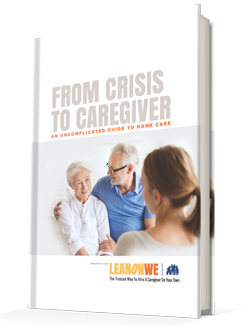5 Simple Ways to Help Your Senior Trust a New Caregiver

Some seniors, particularly those in the early stages of dementia, may have a hard time trusting anyone other than the family member they rely on most.
Yet being solely responsible for an elder’s care can quickly become a heavy burden for that family caregiver -- no matter how loving and committed he or she may be. Reliance on a single family member or other caregiver isn’t in the senior’s best interests either, since it can lead to isolation and in some cases, may even increase the risk of elder abuse.
We all benefit from having strong social connections and varied activities, and seniors are no exception. But as anyone who has cared for an anxious or disoriented senior can attest, widening the circle of care can be very difficult.
Whether you need to share some financial responsibilities with another family member or transfer personal care duties to an in-home caregiver, the transition will take time and patience. Here’s how to get started.
5 Ways to Help Your Loved One Trust a New Caregiver
Read up on these practical strategies to help your loved one develop a trusting relationship with their new caregiver to ensure a smooth and positive transition.
- Involve other family members first
- Choose the right caregiver to hire and transition slowly
- Save sensitive issues for last
- Share your feelings
- Win over stubborn loved ones
Involve other family members first
Before hiring a caregiver, enlist other family members to help with some of the responsibilities your senior currently entrusts to you.
You might ask a sibling to accompany you and your parent to doctor visits or sit down with you when it’s time to pay bills. Eventually, that family member can take over those responsibilities entirely. If your parent still feels anxious, assure them that you’ll continue to be involved, just not as directly as before.
Choose the right caregiver and transition slowly
When you’re ready to hire in-home care, work with a reputable company to identify a compassionate caregiver who’ll take the time to build a relationship with your parent.
The Alzheimer’s Association notes that a person with dementia can sense a care provider’s lack of interest or impatience, so be sure to hire someone who is genuinely interested in supporting your parent’s social relationships and activities.
You’ll want to transition slowly. After finding a qualified caregiver, ask him or her to stop by to meet your parent. We recommend that you keep the first visit short and social, and plan to be present the entire time.
You may want to consider having your caregiver only come a few hours each day in the first week. You can gradually increase over time until you reach the level of help your parent requires. Be sure to have a plan in place and discuss it with the caregiver so they will know when to expect the full shift that you need.
Save sensitive issues for last
During the early weeks, as your parent is still getting to know the caregiver, keep the focus on social activities and companionship.
We recommend that you slowly introduce additional responsibilities, starting with less personal tasks like food preparation, light cleaning, or laundry, and then build up to daily needs like hygiene and dressing.
Share your feelings
If your senior continues to resist outside care, it may help to talk about the stress you feel as the sole caregiver.
Sharing your feelings allows your parent to feel empathy for you and to contribute to her own care by accepting help. Feeling needed and involved, rather than helpless, is an important element of your parent’s emotional health. Though the process may be slower than you’d like, gradually increasing your parent’s trusted support network will serve you both well in the long run.
Win over stubborn loved ones
You can win over a stubborn parent by allowing them to be active participants in choosing their caregiver. Doing so will give them a better sense of control and make them feel more comfortable with the process.
Don’t forget to highlight the benefits -- such as more independence to go and do their favorite activities as well as companionship and support with daily tasks. To shift their perspective, you can also share any success stories you’ve heard from other friends and family members.
If your loved one struggles to warm up to the idea, try reframing the role. You can call the caregiver a “helper” or “assistant” to avoid feelings of lost autonomy.
Start your search for the right caregiver with our free care guide
Introducing a new caregiver into your loved one’s life can be a difficult and delicate process, but choosing the right caregiver is key to building that trusting relationship.
Our free guide has all the information you need to avoid the pitfalls of home care, learn the best way to hire, gain strategies to combat the challenges you may encounter, and much more. Download From Crises to Caregiver: An Uncomplicated Guide to Home Care today.

